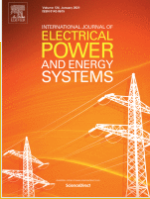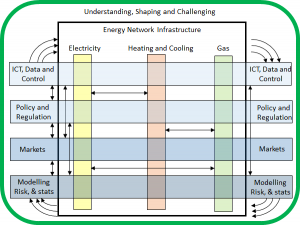About the Author:

Dr Dragan Cetenovic is a Postdoctoral Research Associate at the University of Manchester, where he works as a part of the core research team of the Supergen Energy Network Hub to develop approaches for advanced monitoring and control of multi-energy systems using novel sensor, ICT and Big Data approaches. My focus is on development of methods for advanced state-estimation for dynamic security assessment of integrated multi-energy networks, integration of signals from different types of sensors into a data acquisition platform, and development of efficient methods for real-time Big Data processing and knowledge extraction in future energy networks.
Introduction
Despite their vital importance to the UK’s energy sector, industry and society, there is no current whole systems approach to studying the interconnected and interdependent nature of energy network infrastructure and the challenges it faces. Inspired by this, team of Researchers and Academics from the Supergen Energy Networks Hub, led by Hub Director, Professor Phil Taylor, recently published their joint paper in the International Journal of Electrical Power and Energy Systems (IJEPES).
The paper is available online  and will be published in the February 2022 issue of the Journal. The paper has been written through a well-organized coordination and professional commitment of all signed authors. It is now a good starting point for moving forward with new publications in high impact papers. The IJEPES is a highly respected, Q1‑journal (IF=4.63), with a tradition of 40 years of successful publication of high-quality research papers in the field of power and energy systems.
and will be published in the February 2022 issue of the Journal. The paper has been written through a well-organized coordination and professional commitment of all signed authors. It is now a good starting point for moving forward with new publications in high impact papers. The IJEPES is a highly respected, Q1‑journal (IF=4.63), with a tradition of 40 years of successful publication of high-quality research papers in the field of power and energy systems.
About the paper
The energy sector worldwide is facing considerable pressure arising from the growing demand for clean energy, the need to reduce carbon emissions substantially while adapting to the inevitable impacts of climate change and coping with the depletion of fossil fuels and geopolitical issues around the location of remaining fossil fuel reserves. In this regard, UK Government has committed to a net zero carbon economy by 2050 [1]. Energy networks are vitally important enablers in the global pursuit of a just transition to net zero [2].
The transition to net zero and the energy trilemma (energy security, environmental impact and social cost) present many complex interconnected international challenges. There are different challenges regarding systems, plants, physical infrastructure, sources and nature of uncertainties, ICT requirements, cyber security, big data analytics, innovative business models and markets, and policy and societal changes. As technology and society changes, so do these challenges, and therefore the planning, design and operation of energy networks needs to be revisited and optimised.
Current energy networks research does not fully embrace a whole systems approach and is therefore not developing a deep enough understanding of the interconnected and interdependent nature of energy network infrastructure [3, 4]. This paper provides a novel interdisciplinary perspective intended to enable deeper understanding of multi-vector energy networks. The expected benefits would be enhanced flexibility and higher resilience, as well as reduced costs of an integrated energy system.
Considering drivers like societal evolution, climate change and technology advances, this paper describes the most important aspects which have to be taken into account when designing, planning and operating future multi-vector energy networks. For this purpose, the issues addressing future architecture, infrastructure, interdependencies and interactions of energy network infrastructures are elaborated through a novel interdisciplinary perspective. Aspects related to optimal operation of multi-vector energy networks, implementation of novel technologies, jointly with new concepts and algorithms, are extensively discussed. The role of policy, markets and regulation in facilitating multi-vector energy networks is also reported. Last but not least, the aspects of risks and uncertainties, relevant for secure and optimal operation of future multi-vector energy networks are discussed.

Fig. 1 Block-diagram of the framework for investigation of interfaces between modelling, policy, markets, ICT and risks in multi-vector energy networks.
References
- Committee on Climate Change, “Net Zero: The UK’s contribution to stopping global warming”, May 2019.
- International Energy Agency Report, “World Energy Outlook 2020”, IEA, Paris, 2020 https://www.iea.org/reports/world-energy-outlook-2020
- H. R. Hosseini, A. Allahham, S. L. Walker, P. Taylor, “Optimal planning and operation of multi-vector energy networks: A systematic review”, Renewable and Sustainable Energy Reviews, vol. 133, 2020. doi: 10.1016/j.rser.2020.110216
- Mancarella, “MES (multi-energy systems): An overview of concepts and evaluation models”, Energy, vol. 65, pp. 1–17. 2014. doi: 10.1016/j.energy.2013.10.041